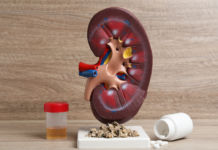For Educational Purpose Only.
Women’s bodies react differently to Chronic Kidney disease(CKD) than to mens. It is important to know how Chronic Kidney Disease affects your body as a woman because around 195 million women worldwide are encountering Chronic Kidney Disease1. Which has now become the eighth leading cause of death in women 1. Women who are from African, Asian or Native American heritage and have a family history of kidney disease, diabetes, and hypertension should be extremely aware of Chronic Kidney disease because of the higher risks they have of developing Chronic Kidney disease. Read our article here if you think you may be experiencing symptoms of Chronic Kidney Disease
So here’s how Chronic Kidney Disease can affect your body as a woman
- Menstrual Cycle
Chronic Kidney Disease causes The body to hold a higher level of waste than it would with a normal kidney. This can affect egg production by preventing menstruation to occur or stop altogether 2. Women should also talk to their doctors about any medications they are taking while being treated for CKD as certain medications can cause cause fatigue and menstrual irregularities. Women should also pay attention for signs of heart disease as lower hormone levels put women at increased risk for heart disease.
- Pregnancy
If you already have Chronic Kidney Disease becoming pregnant can become difficult. This is because of the changes in menstrual cycle as previously discussed. The risk of pregnancy for women with CKD can be high because many CKD patients have high blood pressure, which often gets worse during pregnancy. Pregnancy can also increase the risk of kidney disease because of some pregnancy conditions such as pre-eclampsia, which occurs in 3% to 10% of pregnancies and is associated with acute kidney injury, increased risk for hypertension, and increased risk for chronic kidney disease3.
- Bones
A key function of the kidneys is to help produce hormones such as vitamin D which is nutrient for bones1. The lack of hormones and vitamin D can cause osteoporosis and heart disease. Taking calcium is important because it is recommended that menopausal women and those on dialysis or who have had a kidney transplant take it to help decrease the chance of developing osteoporosis and heart disease2.
- Psychological
More and more individuals are affected by depression and studies have shown that one in four women on dialysis have screened positive for depression1. It is important to remember that you are not alone and there are resources and people out there willing and ready to help.
Sponsor: Kibow Biotech®
References
- Rossbach, M. (2018, February 1). Women And Kidney Disease. Retrieved from https://www.hopkinsmedicine.org/news/articles/women-kidney-disease
- Davita. (n.d.). Women’s Health Risks and Chronic Kidney Disease. Retrieved from https://www.davita.com/education/kidney-disease/risk-factors/womens-health-risks-and-chronic-kidney-disease-ckd
- Maddux, D., Dr. (2018, March 19). Sex Differences in Chronic Kidney Disease. Retrieved from https://fmcna.com/news/features/sex-differences-chronic-kidney-disease/



